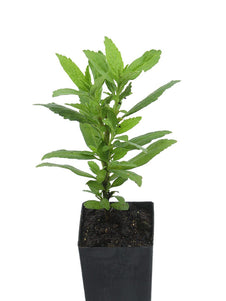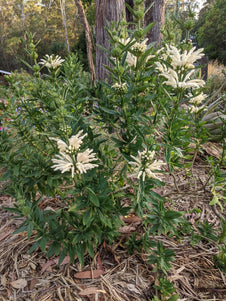









Lion's Tail - White
Lion's Tail - White
- In stock, ready to ship
- Inventory on the way

Usually available: All year
Life cycle: Perennial
Height: 1.2m
Position: Full sun
Soil preference: Well drained
This is how we pack and send your Herb Plants to all states except TAS & WA
You will receive
- 1 Lion's Tail - White Herb Plant in a 50 X 75mm tube - General growing instructions
All of our Herb Plants are grown organically with certified organic potting mixes and fertilizers
Botanical Name: Leonotis leonurus
Lion’s Tail is a large evergreen plant growing to 1-2 meters tall and 50 to 100cm wide. The dark green leaves are held in opposite positions on the square stem. The leaves are lanceolate, 2-10cm long and quite thin, curving downward and may have spiky edges or toothed margins. The leaves decrease in size from the base to the top. They are aromatic when crushed. The long tubular flowers may be a bright orange or creamy white. They are grouped in tiered whorls which go around the stem, rising up the plant to above the foliage in attractive clusters. The flowers are covered in a thick fine down of hairs which extend over the tip creating a fringed effect. They are highly ornamental and bloom in summer or throughout the year in warm climates.
Leonotis leonurus belongs to the family Lamiaceae and is native to South Africa, where it is quite common. The botanical name ’leonurus’ is derived from Greek and refers to the resemblance to a lion’s tail seen by some people. A local common name is Dagga flower. In the wild, Lion’s Tail prefers to grow on hillsides and slopes with intermittent wet and dry periods. Some plant listings mistakenly identify this plant as ‘Motherwort’, due to the similar botanical name of Leonurus cardiaca (LINK). Lion’s Tail is naturalised in some areas of California, Australia and Hawaii.
The white variety is known as ‘Alba’ and the ornamental effect of the white hairs seems to be more pronounced on the white flowers. Beyond this, there does not seem to be very much difference. Both varieties are bird attractants in their native environment, having evolved to accommodate the curved beaks of nectarivorous sunbirds.
Growing Conditions
Leonotis leonurus requires at least 6 hours of sun per day for optimum growth. It is drought tolerant once established, but benefits from regular watering when dry. There is no specific soil type required, except that the ground is well-drained. This plant is said to be frost tolerant but may lose its leaves in very frost prone areas and re-grow them when the weather becomes warmer.
Generally, the flowering period is in summer, continuing in warm regions through to autumn and even winter in the tropics of Australia. In cooler parts of the world, this plant is grown in conservatories for its ornamental value. Pruning may be beneficial to encourage repeat flowering and tidiness.
Medicinal Uses
Leonotis leonurus has a long history of medicinal use by traditional African tribes. It was commonly used for headaches, flu, dysentery, chest infections, epilepsy, constipation, intestinal worms, insect bites, snake bites, menstrual delays and hypertension. Externally it was used for haemorrhoids, eczema, skin rashes, boils and other wounds. Benefits have also been found when using this plant for arthritic, painful and inflammatory conditions and controlling hypoglycemic symptoms. The latter has been found to be supported by scientific research.
This plant has a history of being used for its psychoactive properties which have been compared to a mild version of the Cannabis plant. The dried leaves and flowers are known to create a mild calming effect. The main active constituent is leonurine and in high doses the plant is known to be toxic, affecting bodily organs, blood cells and bodily functions.
Modern herbal medicine mainly uses this plant for premenstrual discomfort and a calming tea infusion may be prepared.
All information provided on this website is for informational purposes only. Please seek professional advice before commencing any treatment.





